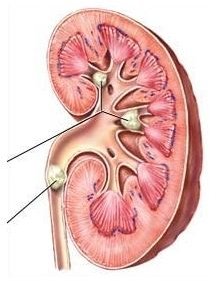Kidney Stone Prevention: Learn the Causes of Kidney Stones and How to Prevent Them
Kidney Stones
The frequency of kidney stones in the United States are steadily rising, along with other diseases associated with diet such as diabetes, high blood pressure, and heart disease.
Men develop kidney stones more than women and most people are over the age of thirty. People with diabetes, high blood pressure, frequent UTIs, and a family history of it are at a higher risk of developing stones.
About three fourths of kidney stones are composed of calcium salts (mostly calcium oxalate). Other types are composed of struvite, uric acid (common in people who suffer from gout), and cystine.
Causes of Kidney Stones and Kidney Stone Prevention
A diet low in fiber and high in refined carbohydrates, animal protein, and fat have been linked to the formation of kidney stones. Alcohol and antacid abuse (aluminum-containing antacids) can also be causes of stones.
Eat more fiber, fruits, vegetables, and complex carbohydrates and limit meat and dairy products to help in the prevention of kidney stones. Vegetarians were shown to have a lower risk of developing stones and so were meat eaters who ate plenty of fresh fruits and vegetables.[1-2]
Eat green leafy vegetables which are a good source of vitamin K. Vitamin K is needed to make a molecule that can stop kidney stone formation.
Excessive salt intake and foods high in purine (including organ meat, meat, shellfish, sardines, anchovies, mackerel, herring, and brewers yeast) can be causes of kidney stones and should be limited.
A low urinary magnesium-to-calcium ratio is a risk factor in stone formation. Kidney stones developed quickly in rats who were given a diet low in magnesium.[3] Foods with a high magnesium-to-calcium ratio include oats, barley, bran, bananas, brown rice, avocado, corn, coconut, rye, and potato. Limit high-calcium, low-magnesium, vitamin D-enriched milk products.
Magnesium alone has been effective in preventing kidney stones and even more effective when used in conjunction with vitamin B6. Foods high in vitamin B6 include whole grains, eggs, bananas, carrots, cabbage, and cauliflower.
Adequate hydration is important because stones form more readily in concentrated urine. Drink 6-8 glasses of water a day.
Teas contain oxalate and can be causes of kidney stones when consumed in large amounts (mostly black tea). Black tea contains about 5mg oxalate per gram of tea (green and oolong teas contain about 1mg or less and herbal teas range from 0-3mg).
Cranberry juice was shown to reduce calcium in the urine by over fifty percent in people with recurrent kidney stones.[4] Drink only 100% pure juice with no added sugar or harmful preservatives.
Maintaining a healthy weight is also important in kidney stone prevention. If you have recurring stones, some foods should be avoided and not just limited (depending on the type of stone). Speak with your doctor or a nutritionist.
References
- [1] Eur Urol 8 (1982): 334-9
- [2] Urol Res 3 (1975): 61-66
- [3] J Urol 124 (1980): 770-4
- [4] Urology 1 (1973): 67-70
Disclaimer
Please read this disclaimer regarding the information contained within this article.
